#linda woolverton
Text
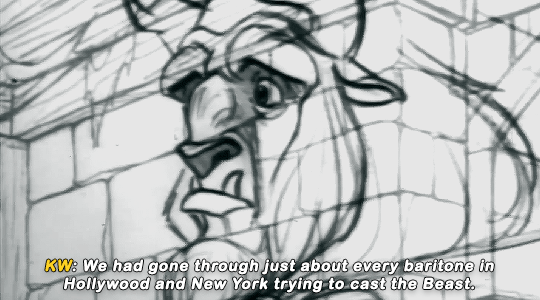
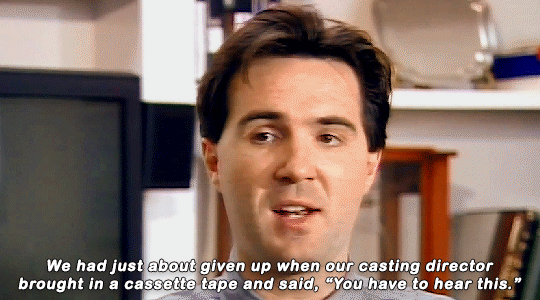

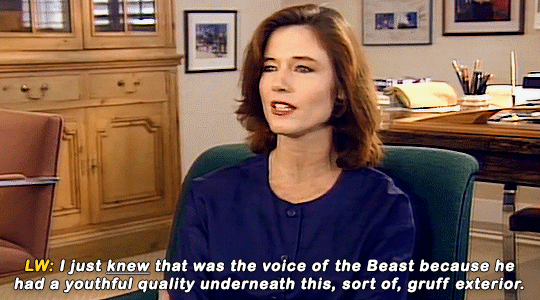


Director Kirk Wise, screenwriter Linda Woolverton, and actor Robby Benson on casting the Beast [x]
They gave me an incredible amount of freedom. I didn't want Beast to be a cartoon character. I played it as though I were doing a Broadway show. As if this was a living person. And I wanted him to be funny. By funny, I don't mean shtick or one-liners. I am talking about real comedy. When real comedy works, and is truthful, especially with the Beast, it comes out of the fact that he is so pathetic. For some reason, I really understood that. Ha! Because of that, they gave me a lot of leeway. [x]
My first audition was recorded on, of all things, a Sony Walkman. As a musician, I had branched out into recording engineer and loved to play with sound. When I saw the Sony Walkman I knew it had a little condenser microphone in it, and if I were to get too loud, the automatic compressor and built-in limiter would 'squash' the voice— and there would be very little dynamic range to the performance. I did a quick assessment and wondered how many people who had come in to audition for the part were making that error: playing the Beast with overwhelming decibels, compressing the vocal waveforms. I decided to give the Beast 'range.' Because of my microphone technique, and an understanding of who I wanted Beast to be, they kept asking me to come back and read different dialogue. After my fifth audition, Jeffrey Katzenberg the hands-on guardian of the film, said the part was mine…
Beauty and the Beast was so refreshingly fun and inventively creative to work on that I couldn't wait to try new approaches to every line of dialogue. Don Hahn is one of the best creative producers I have ever worked with. The two young directors, Kirk Wise and Gary Trousdale, were fantastic and their enthusiasm was contagious. I not only was allowed to improvise, but they encouraged it. It never entered my mind that I was playing an animated creature. I understood the torment that Beast was going through: he felt ugly; had a horrible opinion of himself, and had a trigger-temper. Those are things that, if done right, are the perfect ingredients for comedy. Painful and pathetic comedy— but honest. The kind of comedy I understood...
In the feature world of Disney animation, the actors always recorded their dialogue alone in a big studio, with only a microphone and the faint images of the producers, writers, directors and engineer through a double-paned set of acoustic glass. Paige O'Hara and I became good friends; it was her idea that for certain very intimate scenes, such as when Beast is dying, we record together. We were able to play these scenes with an honest conviction that is often absent in the voice-over world...
The success of this film was the culmination of a team effort but I must say, the honors go to the animators— and for me (Beast), that's Glen Keane — and to Howard Ashman and Alan Menken. This was the perfect example of a crew who 'cared'. And the final results (every frame) of the film represent that sentiment. [x]
#beauty and the beast#disneyedit#robby benson#kirk wise#linda woolverton#actor#director#writer#my gif
1K notes
·
View notes
Text

#musical theater#do you know this musical#poll#aida#elton john#tim rice#Linda woolverton#Robert falls#david henry hwang#language: english
43 notes
·
View notes
Photo
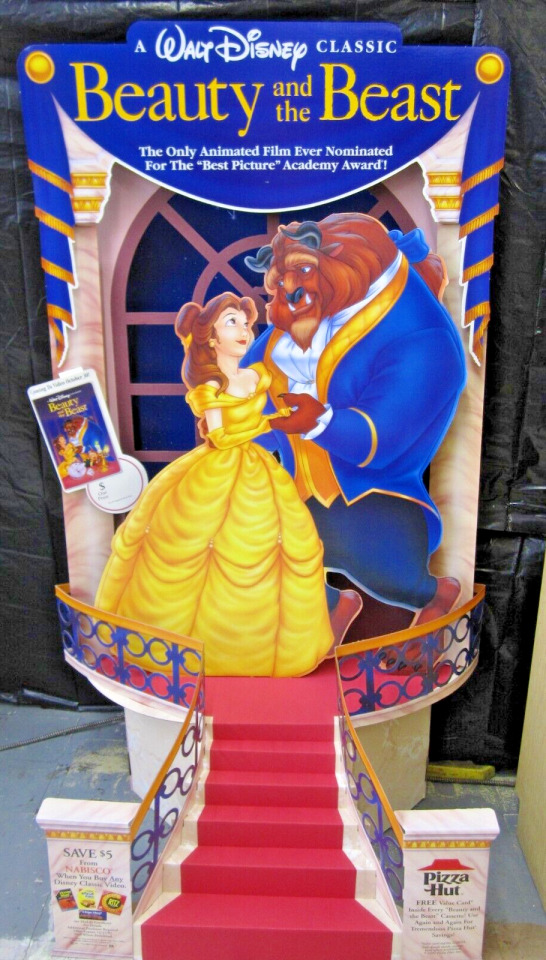
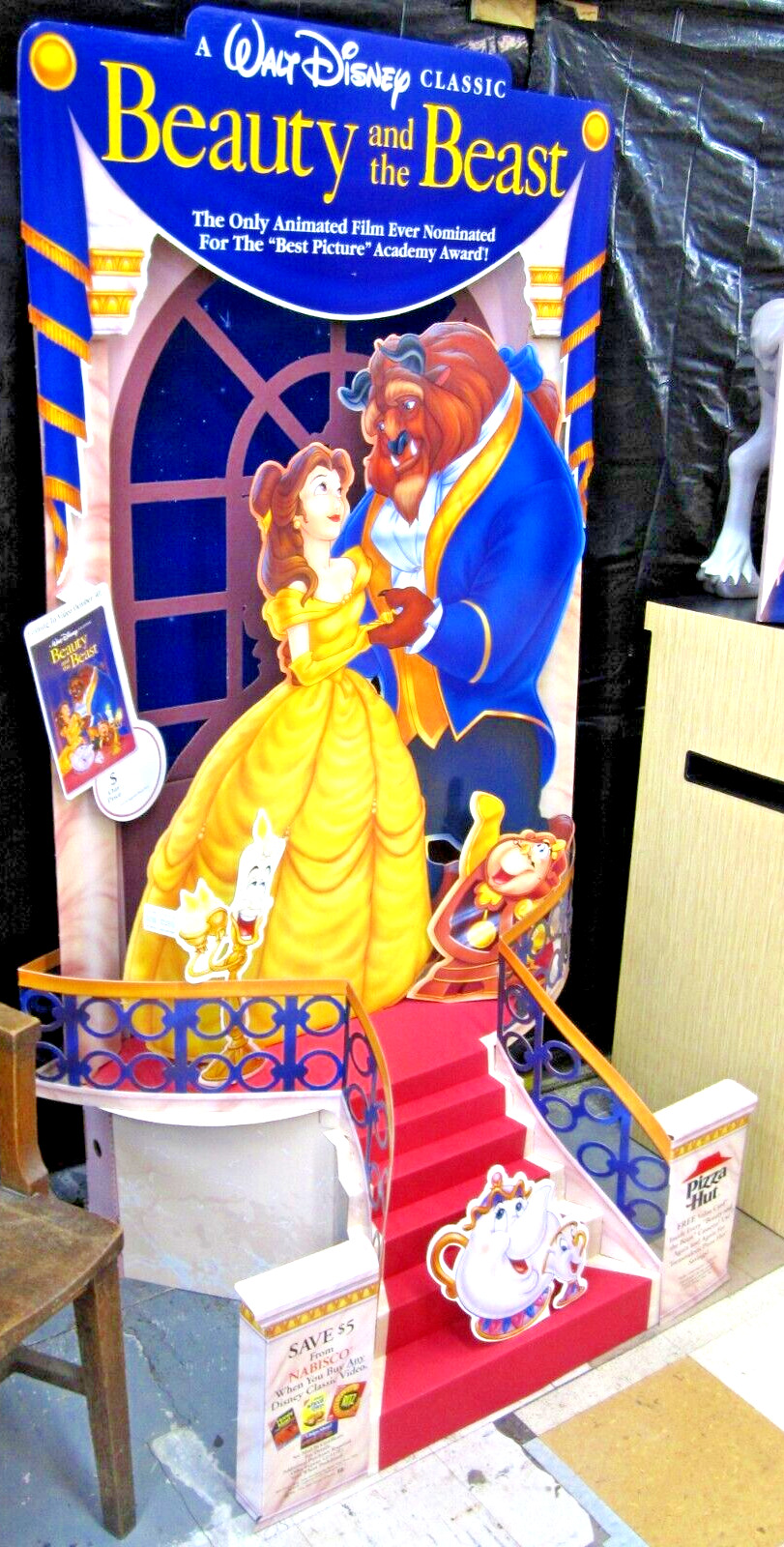
#Beauty and the Beast 1991#Beauty and the Beast#Disney#Pizza Hut#Gary Trousdale#Kirk Wise#Jeanne Marie Leprince de Beaumont#Linda Woolverton#Brenda Chapman#Chris Sanders#Burny Mattinson#Kevin Harkey#Brian Pimental#Bruce Woodside#Joe Ranft#Tom Ellery#Kelly Asbury#Robert Lence#90s
78 notes
·
View notes
Text
Beauty and the Beast: You Can’t Save Someone from Themselves
The Disney version of Beauty and the Beast from 1991 is my favourite movie and I must have watched it twenty-five times, if not more.
But when you watch a piece of media so often, you naturally discover inconsistencies in the plot, or simply details that you don’t understand or don’t quite like.
For me, I was critical for a long time about how naïve Belle is: she never knows the nature of the spell the Beast’s castle is under, she never asks and no one tells her. My point about this was that she remained oblivious to the things going on around her, trying to make the best of a situation that was out of the ordinary but never quite knowing why. I found that this detail somewhat made Belle look like a fool.
Looking back now, I see things differently. The fact that Belle is not aware of the enchantresses’ spell is a major plot point and one of the most interesting and positive characteristics of the story’s heroine.
Women often believe they can or must “fix” a guy who’s in some kind of trouble, with their love, their wisdom etc. And it never works. If a person has some problem that needs to be fixed, they must do so themselves willingly; someone else can only be by their side.
We learn early on that the Beast / Prince is not actually evil, but “selfish, spoilt and unkind”. Belle is the antithesis to this, being generous, altruistic and kind. Most of all, she’s not scheming.
Belle never tries to redeem the Beast. At first, she fears and resents him; then, seeing that he’s making an effort, she gives him a second chance. The actual change comes from the Beast himself, who is well-aware that it is in his hands to break the spell, for himself and also for the people who live with him and depend on him.
For all her maturity and independence, Bell is an innocent girl. She does not imagine that the Beast is a prince, and that he might actually be the right partner for her.
That is why their relationship develops in a natural way: the Beast at first tries to control their relationship and fails, and Belle never tries to control it. She does not search for self-validation by trying to influence someone who obviously has a long way to go. Belle never feels superior to the Beast; when she resents him it’s a pure act of self-protection, untainted by any attitude of the kind “I know better than he does”.
Beauty and the Beast contains a lot of beautiful messages, and this is maybe the most important one if you’re a female watching it: don’t ever try to change a man, or anyone else for that matter. Loving someone means being ready to forgive and giving them a second chance; wanting to “fix” someone is an act of power.
Love and power are opposite to one another. If one partner controls or tries to control the relationship, it’s doomed.
That is why the story of Beauty and the Beast feels so genuine: it’s pure and untainted by the unnecessary drama that is part of so many stories which are allegedly about “love” but lack the most important essence of any healthy relationship: trust.

#disney#beauty and the beast#movies 1991#animated movies#film analysis#relationships#love#linda woolverton#gary trousdale#kirk wise
8 notes
·
View notes
Text

The Lion King (1994, Roger Allers and Rob Minkoff)
09/02/2024
The Lion King is a 1994 animated film directed by Roger Allers and Rob Minkoff, produced by Walt Disney Feature Animation and distributed by Walt Disney Pictures. The 32nd Disney Classic, it was the fifth film released in the Disney Renaissance. It was produced by Don Hanh, and has a screenplay credited to Irene Mecchi, Jonathan Roberts and Linda Woolverton. The original voices cast includes Matthew Broderick, Jeremy Irons, James Earl Jones, Moira Kelly, Rowan Atkinson, Whoopi Goldberg and Jim Cummings. The story takes place in a kingdom of lions in Africa, and was influenced by William Shakespeare's play Hamlet. The film tells the story of Simba, a young lion who must take his father Mufasa's place as king, but after his evil uncle Scar kills Mufasa, the prince must stop him from conquering the Pride Lands and avenge his father.
With a total gross of over $968 million worldwide, it is the highest-grossing traditional animated film theatrically in history, the most successful 2D animated film in the United States, and the 39th feature film in the ranking of the highest-grossing films in the history of cinema. The Lion King earned two Oscars for its achievement in music and the Golden Globe for Best Motion Picture Musical or Comedy. Its songs, with an original score by Hans Zimmer, were written by composer Elton John and lyricist Tim Rice. The film was dedicated to Disney president Frank Wells, who had died in a helicopter crash on April 3, 1994.
A Broadway adaptation of the film debuted in 1997, winning six Tony Awards, including Best Musical.
#the lion king#animation#1994#roger allers#rob minkoff#Walt Disney Animation Studios#walt disney pictures#List of Walt Disney Animation Studios films#jonathan roberts#Linda Woolverton#matthew broderick#jeremy irons#james earl jones#moira kelly#rowan atkinson#whoopi goldberg#jim cummings#william shakespeare#hamlet#simba#Scar#united states#List of highest-grossing films#Golden Globe Award for Best Motion Picture Musical or Comedy#hans zimmer#elton john#tim rice#Frank Wells#1997
8 notes
·
View notes
Note
I don't know if this was also on your list but some people also dislike Belle in part to how Linda Woolverton and Paige O'Hara made comments people have taken as bashing to princesses that came before to put Belle on a higher pedestal
Yes, that would make perfect sense. Just like I would have liked Emma Watson's 2017 Belle better if the movie's whole creative team and its fandom hadn't spent so much time painting the 1991 Belle as inadequate and the new Belle as an improvement
I haven't included that on my list, though, because I haven't read those quotes. I know that Woolverton set out to make Belle different from the earlier princesses, but I've never seen her actually put the other princesses down. And while I have seen O'Hara praise Belle for being "The first princess who wasn't looking for a man" (which is slightly incorrect), I've never seen her bash the others either. Could you please send those negative quotes to me?
8 notes
·
View notes
Text
"Beauty and the Beast" Review: A tale as old as time reinvigorated for the present
Beauty and the Beast is my favourite Disney film, so it's little surprise that I adored the new production currently playing at the London Palladium. The entire production is pure joy - a visual feast and a musical triumph. Thoroughly recommend.
Disney’s new production of Beauty and the Beast, directed by choreographer Matt West, will have you wanting to Be Their Guest time and time again
★★★★★
(more…)

View On WordPress
#Alan Menken#Alyn Hawke#Angela Lansbury#Ann Hould-Ward#Beauty and the Beast#Courtney Stapleton#Darrel Maloney#Disney#Emma Caffrey#Gavin Lee#Howard Ashman#John Shivers#Linda Woolverton#Louis Stockil#Martin Ball#Matt West#Musical Theatre#Musical Theatre review#Natasha Katz#Nigel Richards#Sam Bailey#Samantha Bingley#Shaq Taylor#Stanley A. Meyer#Tim Rice#Tom Senior#West End
4 notes
·
View notes
Text
Alice Through the Looking Glass (2016)
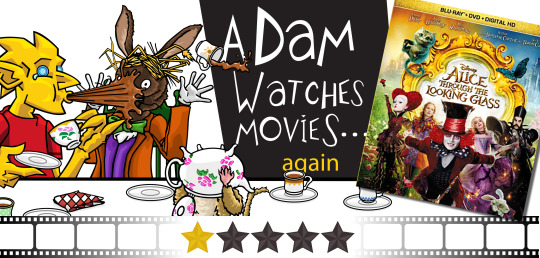
The initial shock is gone and I must admit that a second time around, I like Alice Through the Looking Glass more. Don’t think this means I recommend it. This is an awful film. It’s so badly written it makes your head hurt.
Several years after the first film, Alice (Mia Wasikowska) puts the single-handed invention of feminism on pause to travel to Underland and help her best friend in the whole world Tarrant Hightopp, the Mad Hatter (Johnny Depp). Unresolved daddy issues have thrown him into a depression so severe he’s turning monochromatic and will probably fall over dead. If Alice can enter the lair of clockwork deity Time (Sacha Baron Cohen) and steal his chronometer, she can travel to the past, save the Hatter’s family, and get the nutty tea drinker out of his lethal funk.
I didn’t think a trip to Wonder/Underland could get worse than the 2010 film. I was underestimating the powers of writer Linda Woolverton (whose animated films have been triumphs and live-action efforts... not so much). As a time travel movie, this rivals A Sound of Thunder as one of the worst I’ve ever seen. When Alice needs to go at a specific time, she doesn’t get there early to plan ahead; she gets there minutes before the event she’s attempting to prevent. When she fails to act correctly and history has failed to be altered, she doesn’t try again, she simply gives up. Yet another story that fails to understand the power of time travel.
“But Wait!” you might say. “In the movie, they explicitly say that if you go back to the past and see yourself, it’ll destroy the entire universe! She’s only got one shot!” and you’re right, except that if Alice had any brains, she’d leave herself notes, or do any number of other things to ensure her mission's success. If the residents of Underland are willing to risk all of their existence, past and present for the sake of the Hatter (wait, why is he so important again?) then surely she should give it her best shot.
The flaws don’t stop there. This film just does stuff. It doesn’t matter if it makes no sense. The last time we saw Iracebeth of Crims (the Red Queen, played by Helena Bonham Carter), she was being exiled. Now, she’s returned with an army of vegetable people and possesses certain objects no one in their right mind would've allowed her to leave with. Well, they had to come up with some way to bring her back, right? To keep the fan service going, Alice runs into a child version of the Hatter, of The Cheshire Cat (Stephen Fry), of Bayard (the Bloodhound voiced by Timothy Spall), and other “favorites”. They’ve got plushies to sell, don’t you know? They eclipse every brief reference to the actual Through the Looking Glass novel by Lewis Carroll. Why director James Bobin bothered with them, I don't know. It’s not like this story resembles the source material in any way. It’s made infinitely more dreadful by the completely uncharismatic Mia Wasikowska who is asked to act against a whole bunch of CGI characters and can’t pull it off.
This film can’t even figure out what it wants to do with Underland. Is it supposed to be a real place our heroine travels to, or a figment of her imagination? It doesn’t matter. The plot chugs along, moving pieces back and forth until the credits begin rolling. It’s impossible to care about anything because there are no rules. There's no attempt to recreate the whimsy of the original story or the 1951 Disney film. Alice Through the Looking Glass is little more than special effects, costumes, and makeup vomited onto the screen. (On Blu-ray, July 21, 2017)

#Alice Through the Looking Glass#movies#films#Movie Reviews#Film Reviews#Alice in Wonderland#james bobin#linda woolverton#lewis carrol quotes#johnny depp#anne hathaway#mia wasikowska#rhys ifans#helena bonham carter#sacha baron cohen#alan rickman#stephen fry#michael sheen#timothy spall#2016 movies#2016 films
3 notes
·
View notes
Text
it's wild to me that modern critics have brainwashed so many people into thinking true love, as presented in the classic princess movies, is toxic. we go from snow white's prince calling their love "constant and true" and never giving up on his search for the lost princess throughout endless seasons and forests aimlessly until he finds her, charming tearing apart the entire kingdom when all he had was one slipper that had been left behind because he couldn't imagine a life without cinderella, and phillip fighting a literal fire breathing dragon for aurora.
to appear more "realistic", and effectively more sensible i guess??? disney made the couples afterward decidedly spikey. beast and belle are nothing if not enemies to lovers with their courtship starting with belle literally giving her life to the beast so her father would be spared, jasmine and aladdin have a lot of friction over his lies, i don't even want to get started on john smith and pocahontas nor meg working for the literal devil against hercules's best interest...but that wasn't enough and they continued to suck anything appealing out of these love stories until we reach naveen and tiana trying to kill each other in a swamp as frogs and not liking each other and even being visibly repulsed at one another, rapunzel inflicting physical violence upon flynn with her frying pan in a "cute!" and "quirky" way, and hans being used as a plot device to make us believe a prince charming for us doesn't exist which ends in anna punching him.
and...it's that astounding these bad faith criticisms have been given so much weight and power that they're literally now effectively tearing apart true love in these films to the point where it's now just bickering and physical violence with straight couples that have no chemistry but gay people still don't have a single explicitly "out" couple/storyline :)
#progress#i swear romance is becoming obliterated while gay people are just trying to fight to exist and for basic rights#i feel like there gets to be a point where certain groups are so privileged that their is actually reductive#like we went from true love to enemies to lovers to str8 ppl who don't even like each other and have no business being together#AND THAT IS PROGRESS??#while gay people literally still don't have a single hting#and this is 2022#i'm sick of hearing about the 9th first gay pixar character that always ends up being a monster with 2 lines#also the remakes now and newer stories are just obliterating romance all together#and it just all rings of homophobia to me#i will never trust linda woolverton feminists#but also it just all comes across as like. a corporate person devoid of creativity that's convinced love doesn't exist and has no value#and feels they need to inflict that messaging on everyone else
25 notes
·
View notes
Photo
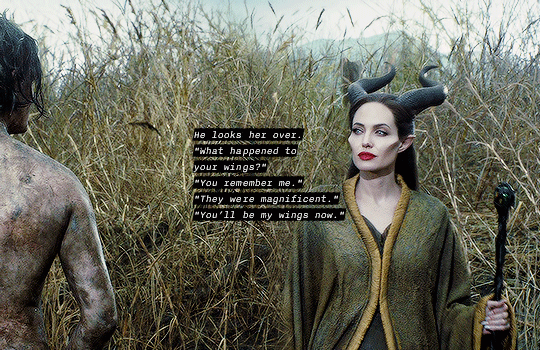
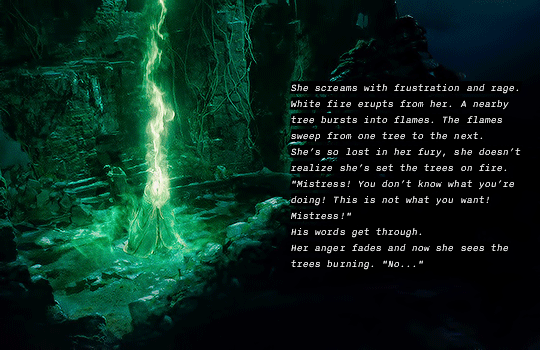
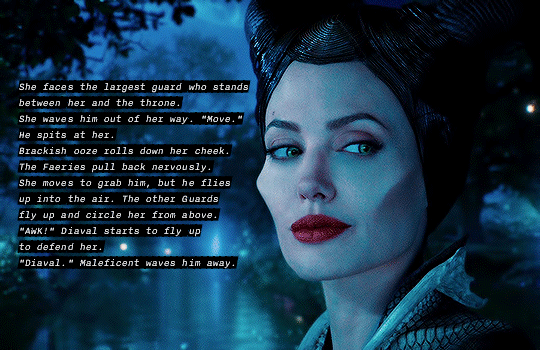


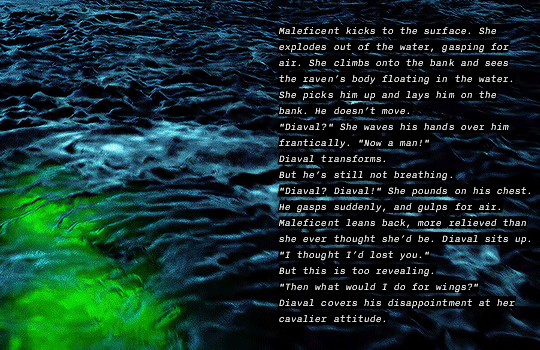
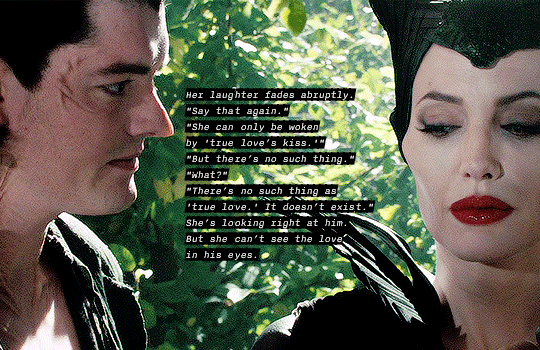


Maleval moments from the Maleficent script by Linda Woolverton
#maleval#maleficent#diaval#maleficentedit#disneyedit#disney#edits#series: maleficent#maleficent 1#I've always wanted to combine all of the maleval moments from the script into one gifset#not sure it turned out all that well#but I'm still glad I did it#the movie made me ship maleval#but it was the script that turned it into an otp for me#it is so unbelievably shippy
410 notes
·
View notes
Text
I’ve said this before but it’s fascinating to me how, in my opinion, a big reason why Disney’s Beauty and the Beast (1991) works so well as an updated adaptation is because it swapped the core narrative parallel from Cupid & Psyche (like Villeneuve and Beaumont had) for Pride and Prejudice.
The wildest part is that I’ve never seen, in any of the books, dvds, interviews, notes or memorabilia I’ve ever collected, anyone from the production mention P&P as a direct reference, not Linda Woolverton, not Brenda Chapman, not Trousdale or Wise, and idk if I haven’t been looking hard enough, if it’s just me thinking this, if they're not aware they did it or if it was all Howard and he passed away before being able to give an interview about it.
What I mean is, narratively-wise, B&B ditches the narrative structure of Cupid & Psyche that most fairy tales under the category of “animal bridegroom” tend to use and, instead, follows the P&P structure to a T, while filling in the gaps with its own characterization or elements from its predecessors (like Gaston coming from the Cocteau film, which is mentioned as a big inspiration many times).
P&P works with points of inflection for character development, because it’s a character driven novel in which the leads are changed and developed through their interactions, whether directly or indirectly, with each other.
A Big point of inflection for Elizabeth and Darcy is the moment things reach it’s lowest point of decline: Darcy’s first proposal. In B&B this is mirrored through the West Wing scene. I could draw parallels of both and go into massive detail, but I don’t wanna make this post longer than it is already.
The second point is the olive branch that starts mending the path and serves as a more honest communication: in P&P it’s Darcy’s letter and in B&B it’s the mutual rescue from the wolves.
The third is the start of the mending process, which in P&P becomes clear in the Pemberley visit and in B&B happens through song, mostly in Something There and Beauty and the Beast. Again, could talk in length about this, but I’ll refrain.
The fourth is the separation, which in P&P happens through Lydia running away with Whickham and in B&B is because Maurice is lost in the woods. In P&P, Darcy finds Lydia and Whickham and pays in secret to save the Bennet’s name for Elizabeth’s sake and in B&B the Beast tells Belle to leave the castle, not letting her know that her leaving would condemn him to remain as a Beast forever.
This is a very important point of comparison to me because this moment, the moment in which Beauty leaves the castle, is the key point in common from both fairy tales to Cupid & Psyche.
Like in other fairy tales inspired by it (d’Aulnoy’s Green Serpent, for example), the leading lady breaks her promise and has to rescue the man she condemns and loves. The Beast asks her to come back, she doesn’t (for similar yet distinctly different reasons in either version) and finds him on his death bed upon finally returning, so she saves him.
In 1991′s B&B though, there is no promise to break, there are no conditions for Belle, she’s free to go and the Beast does not expect her to come back at all. This removes any blame from Belle, which she had in the other versions, while still giving her the agency to save the Beast at the end, something that she does, in this version, without knowing that she could.
The saving isn’t an attempt to mend a wrong she did but something that happens unknowingly, she was never aware of the conditions of the curse or her power in all of it, nor did the Beast expect her to love him back. Both Belle and the Beast think he’s dying. He’s happy to see her one last time, she’s sad to lose him. And then, she saves him.
This “no conditions” moment erases the promise and relates the Beast more to Darcy’s secret actions, not meant to win Elizabeth over but because he cares for her truly; and Belle’s feelings are her own, not influenced by any sense of guilt or responsibility, much like Elizabeth’s.
The fifth is the ultimate conflict, which is meant to separate but has the opposite effect and brings them together. In P&P, it’s Catherine De Bourg's visit to threaten Elizabeth and in B&B is Gaston’s raid to the castle to kill the Beast.
The sixth and final is the declaration of true feelings or, more precisely, the leading lady’s moment to accept hers, given that Darcy claims his feelings have not changed and the Beast has already declared his love to the audience’s eyes.
So, what I find most fascinating (aside from the fact that I love both stories) is how in the 1700s, there was a premise to follow in a myth and in the 1990s the premise to follow became (unknowingly? knowingly? coincidentally?) an 1800s novel, which became as much of a narrative footprint as myths of old. We keep telling stories that carry something of other stories we were nurtured by and I think that’s a really cool aspect of storytelling.
#beauty and the beast#pride and prejudice#beauty and the beast 1991#fairy tales#luly rambles#long post#as an added note#I think this is why my aro ass can love these stories#because it's not really about romance#but about character development
219 notes
·
View notes
Text
Stop treating "Princess" like it's a dirty word!
I have a pet peeve. It's the sexism disguised as feminist notion that it's "empowering" if a girl NOT want to emulate princesses.
There's a popular meme circulating of a little girl saying "Not Princess Leia! General Leia!"
First, princesses out rank generals. In a principality, especially, the princess can lead the army without question.
Also this kind of diminishes all of Leia's kick-ass moments AS Princess Leia. Someone argued with me "Well, in the misogynistic male dominated society the visual most people associate with Princess Leia is her in a collar and chains being held by a slime monster." Excuse me? Leia held her own in battle. And she strangled that slime monster WITH her chains, thus rescuing herself. This revisionist history- that's the sexism.
There are so many powerful princesses worth looking up to. She-Ra, Xena, Wonder Woman- all princesses.
A princess is a female heir to the throne, or in a principality she could be the actual ruler. Why do we keep diminishing it and pretending all princesses are damsels?
Even in the Disney films people like to pretend were all helpless damsels that wasn't the case. Belle (Disney's version) was written by feminist writer, Linda Woolverton.
We need to stop acting like anything traditionally feminine is weakness by default, and something to be ashamed of. So what if a little girl likes the idea of pretty gowns and living in a castle?
We never shame little boys who dream of being the prince in fantasy stories.
17 notes
·
View notes
Text
Mulling on Lestat the musical again and I think the crux of the problem was it got crushed under the weight of its own ambition. The stories Elton John and Linda Woolverton have worked on before appear epic, but are actually quite contained; the lion king, aida, etc. Lestat's tale is too vast and meandering and trying to fit all that lore in 2 hrs, told almost exclusively through quite generic ballads (I'm guessing as an attempt to invoke the time period) was both too much and somehow painfully dull. Too much was happening too fast for you to care about anything. Les Mis was an anomaly, don't attempt to recreate it.
An effective approach would have been something akin to The Great Comet. Take a snippet out of the whole story, focus on that, and be a little experimental with the music. Or don't, the music can still be conventional, but the scope must be smaller. And don't be scared to go crazy, anne certainly wasn't. The main themes might be a little different when separated from the book series as a whole but that's alright, it still works as an individual piece of art.
They could tell a tragic story of the boy who finally made it out and escaped his father's bruising temper, his mother's passivity, and village's accusing eyes, only to have that life he's painstakingly built for himself stolen from him by a monster. It ignores the aspects of lestat that came with his vampirism but that's a fair trade off. This can end with Nicki killing himself, let that be the harrowing end. They can add their own creative spin to it, change the era, make it a folk opera, or something akin to cabaret, the possibilities aren't endless but they're quite a lot.
Or, they could make a 2hr introspection on the rise and fall of a relationship that starts Louis and lestat meeting and ends with lestat dying. Basically season one. Tackle intersectional issues with vampirism as a backdrop, or as a metaphor, take your pic. They can play with the structure a la The last five years; in fact the interview structure itself is already primed and ready for the stage, there's not much to tweak. Let the music rise and fall with their madness. I want to feel as suffocated as Louis does in small box lestat calls love.
They could go even smaller, make it about Claudia, birth to death. How everyone in her life failed her over and over and over again, the lament of a girl who was never truly seen. The framing device is Louis finding all her diaries and reading it for the first time and having a mental breakdown at the end.
There are so many fascinating segments one can zero in on to extract a gem, and as much as I hate to say it, that's kinda the beauty of anne's narrative clusterfuck. I truly hope one day another write and composer would take another look at her world and give it a genuine shot, there's gold waiting to be mined in there.
#i will say though#the pin drop silence in the theatre when lestat kissed his mom was iconic#and is probably the closest that musical was to reaching its full potential#that and 'I want more'#10/10 no notes#interview with the vampire#iwtv#louis de pointe du lac#lestat de lioncourt#the vampire chronicles#lestat the musical
22 notes
·
View notes
Text
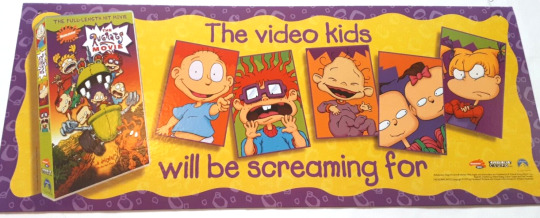
#The Rugrats Movie#Igor Kovalyov#Norton Virgien#David N. Weiss#J. David Stem#Arlene Klasky#Gabor Csupo#Paul Germain#Stu Krieger#Linda Woolverton#VHS#90s
20 notes
·
View notes
Text
i am planning on seeing the little mermaid this week sometime, so, my current ranking of the live-action disney remakes that i've seen, to be updated following:
01. cinderella. god's perfect faery tale movie. it's so beautiful-looking, and -sounding. it's brilliantly cast. it adapted things like the mice in cute ways that weren't distractions or CGI abominations. (that said, my unpopular opinion about this movie is that the dress transformation moment actually *does* look a little too CGI for me. it could have looked WAY more interesting.) it expanded on the story without needing to act like cinderella and her prince were idiots, and most importantly, it does not treat people who enjoy this story like idiots, either.
02. maleficent. the codifier! the risk-taker! it's linda woolverton with the steel chair! the only time disney has put a Twist into one of these that WORKED and didn't feel like dumb fucking around with the audience because THE HEART IS THERE. the cursing at the christening is a perfect illustration of how *good* these movies can be when they want to at honoring what came before and literally bringing it to life. that scene gives me chills every time.
03. the sorcerer's apprentice. this counts as a disney live-action remake. to me. this is a very silly movie and i wish there were five sequels and a balthazar blake meet at disneyland.
04. aladdin and alice in wonderland occupy a deadlocked middle ground for me. i enjoy them a lot and it's clear they were made with care and love by people who wanted to try something a little creative and different, and not just as soulless cash grabs by The Rat. but the execution still leaves things to be desired. why must the hatter be so goddamn annoying? why the Girl Power clichés? WHY DID YOU FIGURATIVELY AND LITERALLY DEFANG JAFAR?
05. dumbo. it tried. i can never decide if i think dumbo looks charming or terrible and the plot was insanely contrived but, hey. i love circuses and i whooped out loud when i saw the map beginning in sarasota, florida. colin farrell did NOT have to put his whole heart into this movie but god bless the man for it.
06. the jungle book. it was fine, and far be it from me to look a gift tiger voiced by idris elba in the mouth. but this was not necessary.
07. alice through the looking-glass. points for alice's dope chinese court outfit and the, what, sixty seconds featuring richard armitage and rhys ifans. demerits for literally everything else. possibly unfair to class this with the others since it's technically not a live-action remake but a sequel to one.
08. 101 dalmatians. even as a kid i thought it was silly that this movie got made, and i just don't find cruella very funny in this. plus i get annoyed every time i see that take about how she says SUCH feminist things.
09. beauty and the beast. how 'bout that dan stevens done up full rococo dandy? that's all i've got.
13 notes
·
View notes
Text
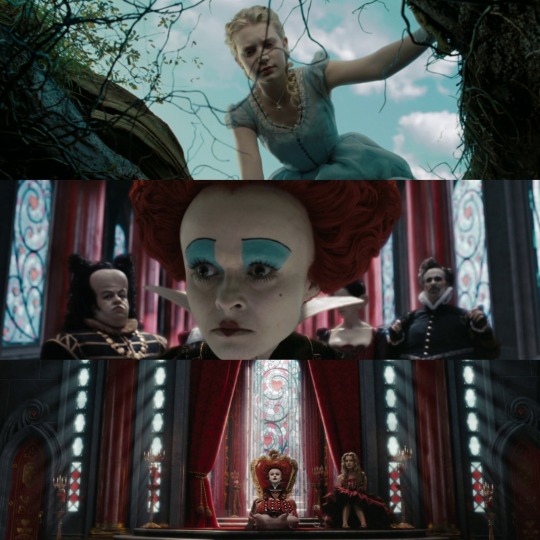
Alice in Wonderland (2010, Tim Burton)
30/03/2024
Alice in Wonderland is a 2010 film directed and co-produced by Tim Burton.
Produced by Walt Disney Pictures and distributed by Walt Disney Studios Motion Pictures, the film is written by Linda Woolverton and based on the novel of the same name by Lewis Carroll and the 1951 film of the same name (13th Disney Classic). The main actors in the film include Johnny Depp, Mia Wasikowska, Anne Hathaway, Helena Bonham Carter and Crispin Glover. The film mixes visual and photography technologies between live action and motion capture.
The film received three nominations at the 2011 Oscars, winning two (best costume design and best production design).
A sequel, Alice Through the Looking Glass, was released in 2016.
While Hamish is declaring himself, Alice spots the White Rabbit, whom she had already met previously, in the gardens of the villa and chases him into the woods.
After leaving the tiny door, she finds herself in a garden where there are the White Rabbit, the Dormouse, the Dodo and the Tweedledum and Tweedledee twins.
To get an answer, they go to the Caterpillar, who is in possession of the Oraculum, a magical parchment capable of illustrating future events: this shows that Alice's destiny is to kill, on the Joyful Day, the Jabberwocky, a monster bloodthirsty dragon-like, serving the Red Queen.
#alice in wonderland#film#2010#tim burton#walt disney pictures#Walt Disney Studios Motion Pictures#Linda Woolverton#alice's adventures in wonderland#lewis carroll#List of Walt Disney Animation Studios films#johnny depp#mia wasikowska#anne hathaway#helena bonham carter#crispin glover#live action#motion capture#academy awards#83rd Academy Awards#Academy Award for Best Costume Design#Academy Award for Best Production Design#Sequel#alice through the looking glass#2016#white rabbit#dormouse#Dodo#caterpillar#jabberwocky#Dragon
3 notes
·
View notes